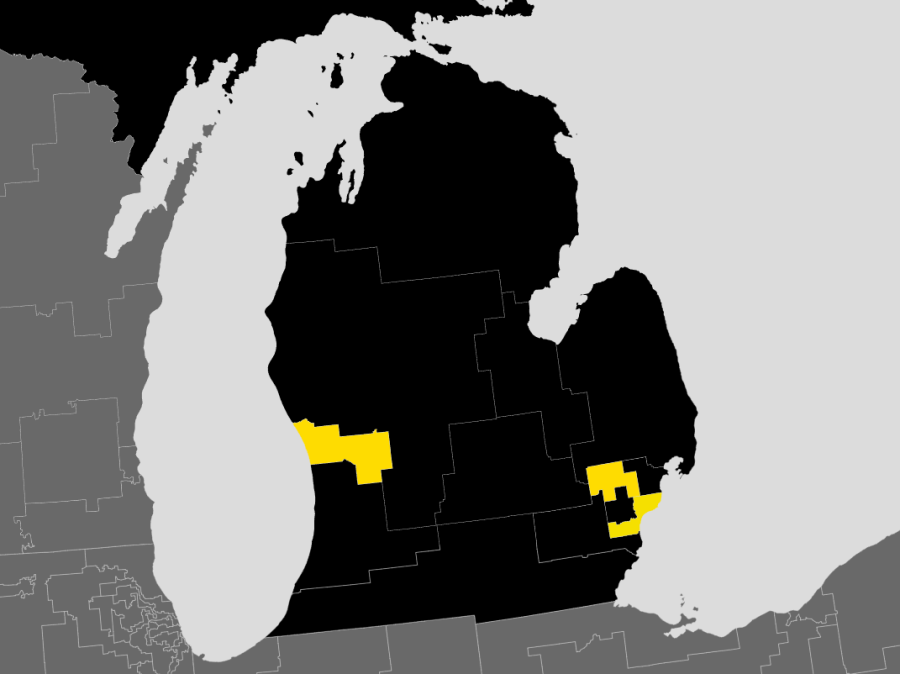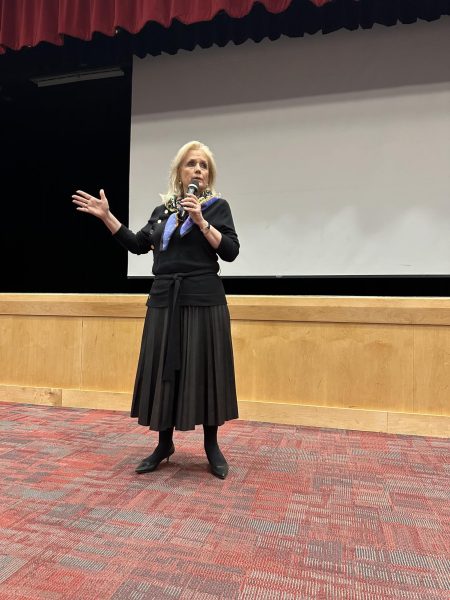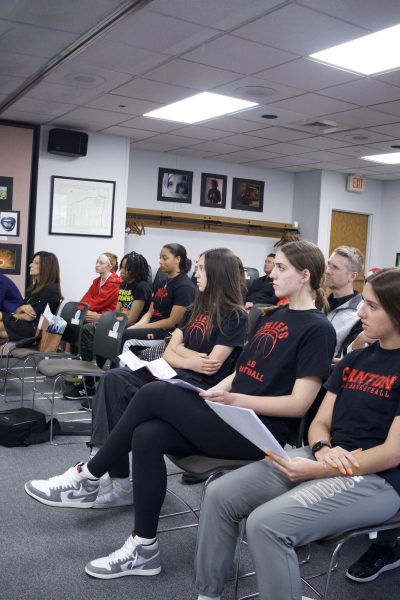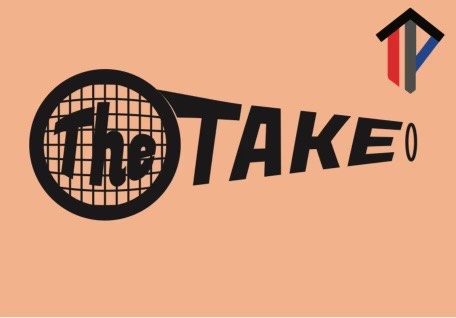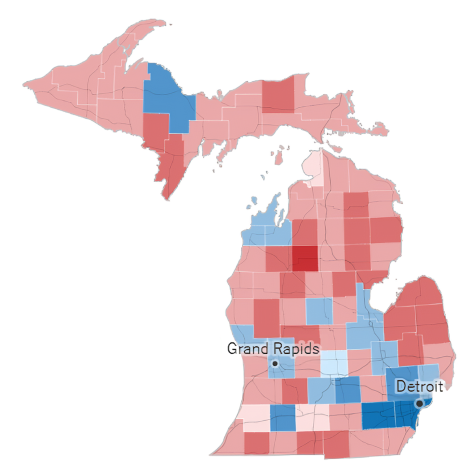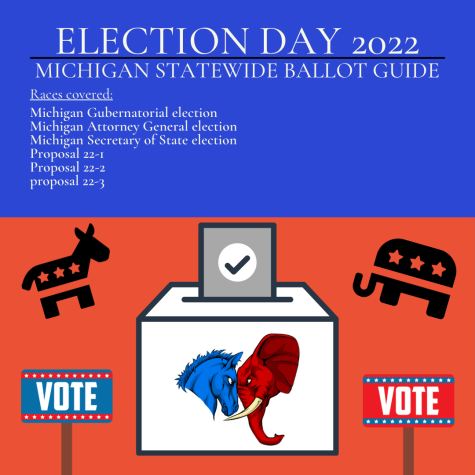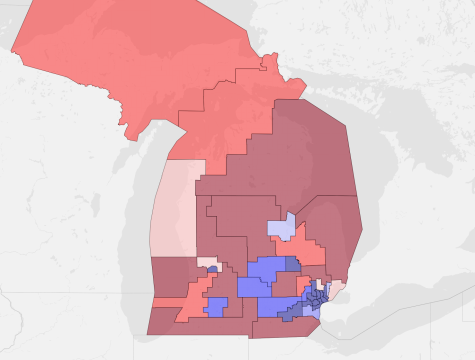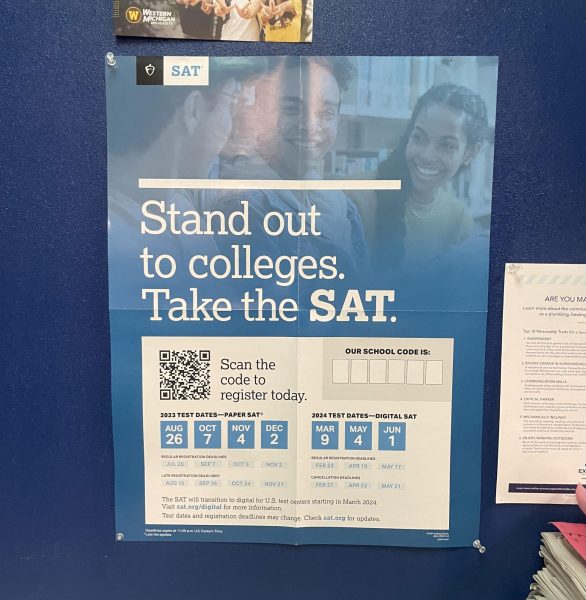The 2022 Michigan primary elections: four races to watch
Michigan’s 13 congressional districts are displayed on a map, with the highlighted primary races colored yellow. August 1, 2022.
Polls for the 2022 Michigan primary elections open at 7:00 a.m. on Tuesday, August 2, and control of a great many seats and governmental positions hang in the balance.
On the Republican side, the ongoing conflict between classical conservatives and the new wing of the party aligned with Former President Trump continues to rage throughout the state and the nation, inflamed and defined by “the big lie,” the claim that the 2020 election was fraudulent.
On the Democrat side, the ever-growing progressive wing of the party continues to conflict with and confront the traditional stances on social issues and classic economic populism that has typically defined the Democratic party, with issues such as healthcare, Israeli-Palistinian relations, taxation, climate and abortion policy setting the debate stage.
Across Michigan’s 13 congressional districts, three primary elections in particular (alongside the continued battle to control the governorship) are regarded as the most electorally significant.
Michigan’s third congressional district Republican primary
Incumbent representative Peter Meijer (R-Grand Rapids) of the Meijer retail company is facing a primary challenger from his ideological right in John Gibbs, a Trump-Endorsed former Director of the Office of Personnel Management running inside of the Grand Rapids based district that Meijer currently represents.
The winner of the election will go on to face uncontested Democrat Hilary Scholten in the November general election.
Meijer, one of the 10 House Republicans who voted to impeach Trump on incitement of insurrection after the January 6th attack on the Capitol, has continually provoked the ire of hardline conservatives by supporting bipartisan initiatives such as the Respect for Marriage Act and the Safer Communities Act.

Gibbs has made debunked conspiracy theories surrounding the 2020 election central to his campaign, winning himself the Trump endorsement and drawing a clear contrast between himself and Meijer.
Meijer first won his seat during the 2020 election, beating Scholten by a 6% margin of victory.
This primary election is viewed by many as a referendum on the power over the Republican party that the former president holds, as many continue to wonder if his backing is enough to oust an incumbent representative.
The Democratic Congressional Campaign Committee (DCCC) has come under intense fire for attempting to run ads intervening in the primary, in an apparent attempt to boost the name recognition and conservative appeal of Gibbs, believing that the much farther ideologically right candidate will be the easier opponent to beat in the general election.
“Over the past year, in private and in public, these Democratic colleagues praised the courage of Republicans like me,” said Meijer in a “Common Sense” op-ed. “Majority Leader Steny Hoyer called my vote [for impeachment] ‘an impressive display of courage and integrity.’ Watching this unraveling inside my party has been utterly bewildering. The only thing that has been more nauseating has been the capacity of my Democratic colleagues to sell out any pretense of principle for political expediency—at once decrying the downfall of democracy while rationalizing the use of their hard-raised dollars to prop up the supposed object of their fears.”
The ad purchase by the DCCC amounted to $435,000, which is near the $479,000 that Gibbs has raised for his entire campaign. Meijer, by contrast, has raised $2,700,000 for his re-election bid this cycle, while Scholten has raised $1,230,000.
During 2020 redistricting, the district became significantly more Democrat, going from an average partisan score of R+8 to D+3.
The general election for the district is currently regarded as a tossup.
Michigan’s 11th district Democratic primary
The 2020 redistricting cycle left two Democrat congressional incumbents (Haley Stevens, Rochester Hills, and Andy Levin, Berkeley) in a primary fight to represent the new 11th district, located within Oakland county north of Detroit.
Levin, the nephew of former Senator Carl Levin, is typically viewed as the more liberal candidate. Most notably, he has been endorsed by Senator Bernie Sanders, Senator Elizabeth Warren and the Planned Parenthood action fund. Stevens, meanwhile, is viewed as the more traditional “blue dog” candidate and has been endorsed by former Secretary of State Hillary Clinton.
United States-Israel relations have become a central theme throughout the later months of the primary. Stevens has pledged “unequivocal support” for the nation of Israel, while Levin, a self-decribed zionist, has been far more critical of Israeli actions toward the Palistinian people.
The United Democracy Project, a pro-Israeli super political action committee (PAC), has spent nearly $4,000,000 promoting Stevens.
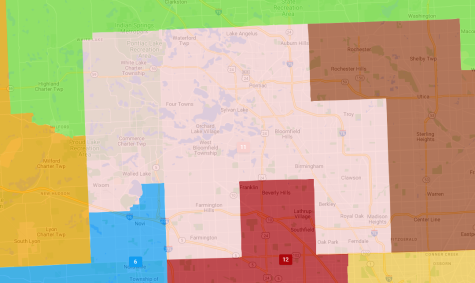
Levin, a Jewish former synagogue president, sponsored the Two State Solution Act, a bill seeking to block Israeli settlement deeper into the Palestinian West Bank territory.
A Target-Insyght poll shows Stevens beating Levin by a landslide margin of 58%-31%, with 11% of likely primary voters undecided.
Stevens has outraised Levin by nearly double, with Stevens having raised $4,700,000 and Levin $2,660,000.
The 11th district is considered a safe Democrat seat in the November general election.
Michigan’s 13th district Democratic primary
Representative Brenda Lawrence announced her retirement from the House of Representatives, kicking off a nine-way primary fight for the Democratic nomination for the Detroit-based district.
The candidates vying for the seat include State Representative Shri Thanedar, product manufacturer Lorrie Rutledge, former Director of the Office of Intergovernmental and Public Liaison Portia Roberson, candidate Sam Riddle, attorney Sharon McPhail, State Senator Adam Hollier, Principal Michael Griffie, Detroit Public Schools Board of Education member Sherry Gay-Dagnogo and entrepreneur John Conyers.
This primary race has attracted an unusual amount of outside spending.
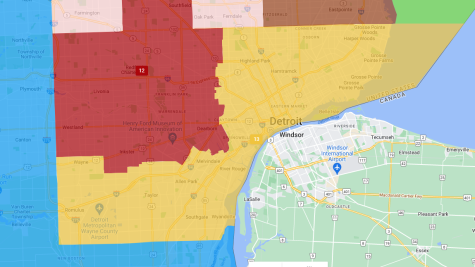
According to a report by Opensecrets, a website that tracks political donations to federal campaigns, nearly $5,000,000 in outside spending has been used to boost Hollier and attack Thanedar. Prior to the 2022 election cycle, the record for outside spending in the 13th district was $153,000 in the 2012 elections.
According to the report, Thanedar has loaned his own campaign $5,200,000. This is a staggering increase from the previous self-financing record, which stood at a mere $16,500 and was set in 2020.
Much of this outside spending again comes from the United Democracy Project super PAC, which has spent over $2,500,000 boosting Hollier.
A recent Target-Insyght poll shows Thanedar with a slight lead, well within the margin of error.
This race is rated as a safe Democrat seat in the November general election.
Michigan governor Republican primary
The Republican primary for the Michigan Gubernatorial election has been fought with scandal, but the party has at last seemed to land on a candidate for governor.
Tudor Dixon, a conservative media personality from the Muskegon area, has risen as a clear frontrunner in the closing weeks before the primary. Recent polling shows her leading the crowded field of candidates from anywhere between 9%-25%, and she received an endorsement from Trump on the night of July 29th.
She is facing chiropractor Garrett Soldano, Pastor Ralph Rebandt, businessman Kevin Rinke and real estate broker Ryan Kelley.
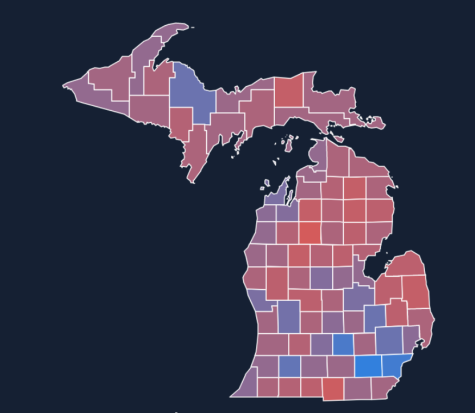
All five candidates on the ballot hail from the Trump-aligned wing of the Republican party, and all have been competing for his endorsement throughout the primary election.
Dixon has long since received the backing of the DeVos family, a well-known and influential name within Michigan Republican circles. Her opponents have criticized the support of the DeVos family as a sign that Dixon is “beholden to establishment politicians,” while her allies have pointed to both the support of the DeVos family and the support of the former president as a sign that Dixon can unite the fractured Republican party.
On the night of May 23, 2022, the state elections bureau stated that five Republican candidates, including former Detroit Police Chief James Craig and businessman Perry Johnson, did not turn in enough valid signatures to qualify for primary. Craig has since filed to run as a write-in campaign for the election, but he is not expected to be considered competitive.
Regardless of the winner of the primary, Michigan Republicans are expected to be fighting an uphill battle for control of the governorship.
Incumbent Democrat Gretchen Whitmer has managed to maintain big leads, both in polling and in fundraising.
Recent polls have shown Whitmer holding double digit leads over all of her potential general election opponents. Racetothewh gives Whitmer an 82% chance of retaining her seat, while FiveThirtyEight gives Whitmer a 95% chance of winning the election.
Of the Republican candidates appearing on the ballot, Rinke is leading the fundraising field, with $10,400,000. $10,000,000 of the money raised by Rinke came from donations he made to his own campaign. Soldano has raised $2,010,000, Dixon has raised $1,600,000, Rebandt has raised $400,000 and Kelley has raised $306,000.
All hail in comparison to Whitmer, who has raised $23,700,000 for her re-election campaign.
This race is currently rated as likely Democrat in the November general election.
Your donation will support the student journalists of Salem High School - MI. Your contribution will allow us to purchase equipment and cover our annual website hosting costs.

RJ Doroshewitz is a senior at Salem High School who has a wide variety of interests. In the fall, he'll be attending George Washington University in downtown...


